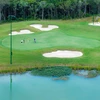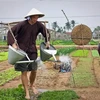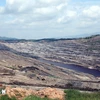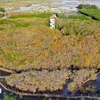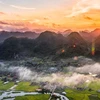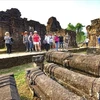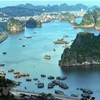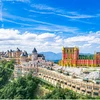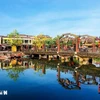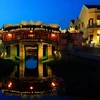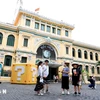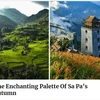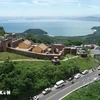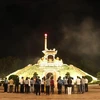Breathing the absolute purity of fresh air beneath thick canopies of flora, along paths winding through hills and mountains sounds nice. Those interestede in romantic adventure should read on.
During this trip, visitors will have many marvelous opportunities to record a peaceful short break from city madness by taking photos of breathtaking, picturesque scenes. Those who are spectacularly lucky may just get a chance to see the famously elusive "unicorns" that live deep in the forest.
Pu Mat National Park, which covers an area of 91,113ha, bordering Laos on the west and spreads across three districts in Nghe An province –Tuong Duong, Con Cuong and Anh Son. It takes about three and half hours to get there from Vinh city or about eight hours from Hanoi, by either coach or train.
From Con Cuong township, travellers embark on a long winding, narrow path leading to the Kem waterfall, one of two popular destinations for visitors.
The sealed path zigzags through narrow valleys crowded in by red-dirt hills and limestone mountains. They are densely covered with bushes at the base, but in the higher areas, there are some big trees, providing an abundance of fresh air amid an atmosphere of perfect peace.
Travelling along the path, visitors often witness daily activities of the native ethnic people, the Dan Lai, who still carry firewood and foliage used for covering the roofs of their housesin huge basketsstrung on their backs.
The path includes dozens of small bridges spanning small streams in which children can play in the crystal waters. The bridges provide a stunning background for those handy with a camera.
At one or two points on the road further into the park, you can see stilt houses scattered over a valley by a stream far below. This where the Dan Lai people live in a largely self-sufficient way by growing rice and weaving cloth for their own clothing.
After half of hour or so bumping alongthe path on a motorbike, from a few hundred metres away, a stunning waterfall comes into view.
The water pours down from an impressive height, equal to the size of a 20-storey building. It is so close you can almost touch it.
The closer you get to the waterfall, the more formidable and powerful it feels. The stream and ponds might not be big enough to accommodate hundreds of visitors at one time, but they are really ideal for a small group to swim in or take photos right at the foot of the waterfall as rainbows shimmer in the background.
A dozen or so metres from the waterfall is a rest area where people can quench their thirst in summer or get an energy boost from native specialties such as rice cooked in tubes of bamboo.
After riders have exhausted the picture opportunities at the base of the waterfall from many different angles, it's time to return to the path, take a right turn and head for the second destination, Pha Lai Dam in Mon Son commune.
The path leading to the dam does not compare with the tranquil and verdant slopes leading to the Kem waterfall. Here you are expected to deal with unchained dogs, wandering cows and buffaloes left by locals to graze and roam as they choose.
After riding for about 10km, visitors encounter the lower reaches of a stream flowing down from the Giang river, which is held in check further up in the park by a 100m wide dam.
The thing, however, that impresses most is not the dam itself but a 100m-long suspension bridge connecting the two banks of the stream just down from the dam itself.
The Golden Gate-style miniature fits perfectly with the dam and stream to create romantic vistas, which prompted me to think that if the bridge was in Hanoi. it would be swamped by young couples wanting to take their wedding photos.
Vu Thi Suong, who sells refreshments by the dam, said the peak season is from April to August.
"Young people make up a large proportion of tourists. Most foreign visitors are from China, the Republic of Korea and Russia," Suong said. The water held back by the dam makes it possible to visit native villages by boat.
This enables trips to a handful of villages inhabited by the Dan Lai tribal folk, whose traditional ways of living have not changed much in centuries.
After arranging a boat and negotiating the itinerary and the price for a round-trip, you will be taken to one, two or three villages where you can see how the Dan Lai people work and live.
Upon completing your boating adventure it is time to find a place to stay, for example in a lovely, family-run mini hotel in the Lien Son village.
Others may call it a day and get back on a coach back home, left with memories of where unicorns reside.-VNA
During this trip, visitors will have many marvelous opportunities to record a peaceful short break from city madness by taking photos of breathtaking, picturesque scenes. Those who are spectacularly lucky may just get a chance to see the famously elusive "unicorns" that live deep in the forest.
Pu Mat National Park, which covers an area of 91,113ha, bordering Laos on the west and spreads across three districts in Nghe An province –Tuong Duong, Con Cuong and Anh Son. It takes about three and half hours to get there from Vinh city or about eight hours from Hanoi, by either coach or train.
From Con Cuong township, travellers embark on a long winding, narrow path leading to the Kem waterfall, one of two popular destinations for visitors.
The sealed path zigzags through narrow valleys crowded in by red-dirt hills and limestone mountains. They are densely covered with bushes at the base, but in the higher areas, there are some big trees, providing an abundance of fresh air amid an atmosphere of perfect peace.
Travelling along the path, visitors often witness daily activities of the native ethnic people, the Dan Lai, who still carry firewood and foliage used for covering the roofs of their housesin huge basketsstrung on their backs.
The path includes dozens of small bridges spanning small streams in which children can play in the crystal waters. The bridges provide a stunning background for those handy with a camera.
At one or two points on the road further into the park, you can see stilt houses scattered over a valley by a stream far below. This where the Dan Lai people live in a largely self-sufficient way by growing rice and weaving cloth for their own clothing.
After half of hour or so bumping alongthe path on a motorbike, from a few hundred metres away, a stunning waterfall comes into view.
The water pours down from an impressive height, equal to the size of a 20-storey building. It is so close you can almost touch it.
The closer you get to the waterfall, the more formidable and powerful it feels. The stream and ponds might not be big enough to accommodate hundreds of visitors at one time, but they are really ideal for a small group to swim in or take photos right at the foot of the waterfall as rainbows shimmer in the background.
A dozen or so metres from the waterfall is a rest area where people can quench their thirst in summer or get an energy boost from native specialties such as rice cooked in tubes of bamboo.
After riders have exhausted the picture opportunities at the base of the waterfall from many different angles, it's time to return to the path, take a right turn and head for the second destination, Pha Lai Dam in Mon Son commune.
The path leading to the dam does not compare with the tranquil and verdant slopes leading to the Kem waterfall. Here you are expected to deal with unchained dogs, wandering cows and buffaloes left by locals to graze and roam as they choose.
After riding for about 10km, visitors encounter the lower reaches of a stream flowing down from the Giang river, which is held in check further up in the park by a 100m wide dam.
The thing, however, that impresses most is not the dam itself but a 100m-long suspension bridge connecting the two banks of the stream just down from the dam itself.
The Golden Gate-style miniature fits perfectly with the dam and stream to create romantic vistas, which prompted me to think that if the bridge was in Hanoi. it would be swamped by young couples wanting to take their wedding photos.
Vu Thi Suong, who sells refreshments by the dam, said the peak season is from April to August.
"Young people make up a large proportion of tourists. Most foreign visitors are from China, the Republic of Korea and Russia," Suong said. The water held back by the dam makes it possible to visit native villages by boat.
This enables trips to a handful of villages inhabited by the Dan Lai tribal folk, whose traditional ways of living have not changed much in centuries.
After arranging a boat and negotiating the itinerary and the price for a round-trip, you will be taken to one, two or three villages where you can see how the Dan Lai people work and live.
Upon completing your boating adventure it is time to find a place to stay, for example in a lovely, family-run mini hotel in the Lien Son village.
Others may call it a day and get back on a coach back home, left with memories of where unicorns reside.-VNA
